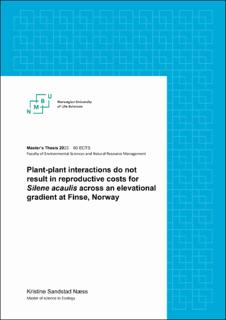| dc.description.abstract | Plants interact negatively with each other through competition for space, light, or belowground resources, resulting in a reduction in individual survival, growth, or reproduction. Facilitation, on the other hand, is a positive interaction wherein a plant can potentially increase another individual’s ecological success. The role of facilitation is predicted to increase along with abiotic levels of stress. Silene acaulis is an alpine cushion plant known to facilitate other species in harsh environments, but less is known about the potential costs that S. acaulis may incur while facilitating other species.
I investigated the reproductive costs of plant-plant interactions on S. acaulis along an elevational gradient at Finse, Norway. Across three elevations, I removed all species growing within 30 of the S. acaulis cushion plants and left 30 cushions untreated. I measured the size, number of flowers and number of seed capsules for all cushions. I also counted and weighed the seeds within each seed capsule. Species richness, diversity, percent cover, and composition were compared between untreated cushions and nearby open areas.
I found no evidence for facilitation by S. acaulis, but rather weakly competitive effects at all sites. At the low and mid elevation, there was a higher cover of bryophytes in open areas than within untreated cushions, suggesting that bryophytes were outcompeted for space by S. acaulis. At the mid and high elevation, there was a higher cover of lichens in open areas than within untreated cushions, implying that S. acaulis outcompeted lichens for space. No reproductive costs of plant interactions were found for S. acaulis at any elevation.
The lack of a shift in species interactions for S. acaulis along an elevational gradient suggests that differences in elevation did not result in a gradient of abiotic stress as expected. It also suggests that the sites were generally less stressful than predicted. The impact of climate change on alpine habitats, which can lead to an increased role of competition in harsher environments, may explain my results. Increased knowledge of how environment impacts alpine ecosystems and species interactions is essential to understanding the long-term persistence of foundational species such as S. acaulis and future alpine plant community composition. | |
